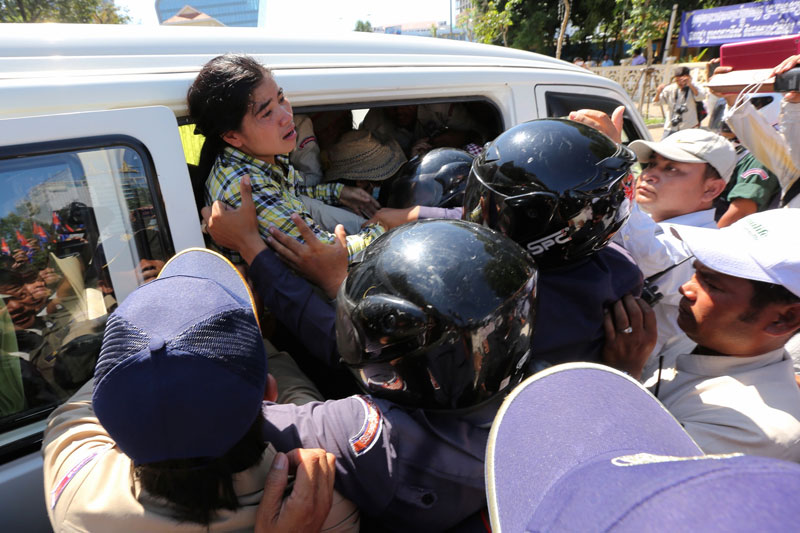Phnom Penh authorities arrested seven anti-eviction activists Monday morning protesting the recent flooding of the city’s Boeng Kak neighborhood, which they blame on a CPP senator’s filling in of a local lake. The group will be sent to court to be charged Tuesday, officials said.
About 20 of the activists had dragged a bed frame onto Monivong Boulevard in front of City Hall to demand that the government immediately drain the standing floodwaters in some of their homes. The protesters scuffled with district security guards for about half an hour after the guards pushed the bed off the road and knocked off its legs.

The protesters then moved off the street and continued demonstrating in front of City Hall, where the seven, including well-known activist Tep Vanny, were arrested.
“We have arrested seven people who violated the law by blocking the public road,” City Hall spokesman Long Dimanche said. “We have sent them to the municipal police…and the municipal police will make a report.”
Phnom Penh police chief Lieutenant General Chuon Sovann said the arrested protesters, all women, would be sent to court Tuesday for obstructing traffic.
“They never follow the law,” he said. “We will send them to the court [today] following Article 78 of the Traffic Law, which states clearly that people who use anything to obstruct public traffic will be punished with between one month and one year in prison.”
Boeng Kak residents say the regular rainy season flooding of their neighborhood—filling their homes with fetid, trash-strewn water—only started in 2008, when ruling party senator and businessman Lao Meng Khin’s company, Shukaku Inc., started filling in the local lake with sand to lay the ground for his real estate project.
Residents accuse the city of leasing the area, home to some 4,000 families, to the senator and subsequently evicting most of them illegally.
At Monday’s protest, before the arrests were made, Ms. Vanny said their homes have been inundated with filthy water since Thursday. She said the municipal government caused the flooding by letting Shukaku fill in the local lake, and was therefore obligated to clear it away.
“We cannot live like this,” she said. “We cannot sleep and we don’t have a place to cook or go to the bathroom and we are in danger of electric shock. The water smells like shit,” she said. “We are living with sewer water.”
District security chief Kim Vutha told the protesters that local officials were working to solve the problem as fast as they could now that the annual Water Festival was over. The three-day public holiday ended Friday.
“After the Water Festival, we went there to help immediately,” he told them. “Yesterday I went there with people from morning to night to clean…. We are paying attention.”
Am Sam Ath, technical supervisor for rights group Licadho, said the authorities should be doing more to help the protesters, not arresting them.
“It is a violation of their rights to arrest them because City Hall is responsible for getting the water out of their homes since it is developing the area,” he said. “It should find a solution for them…. Instead, the authorities arrest them.”
By Monday evening, about 30 relatives of the detained women had gathered outside the headquarters of the municipal traffic police office to demand their release, according to Long Kim Heang, a spokeswoman for the Housing Rights Task Force.
Of the seven women taken into custody Monday, five were among the 13 Boeng Kak activists arrested in May 2012 for protesting against Shukaku on the land that had been leased to the company.
Two days after those 2012 arrests, with uncharacteristic speed, the municipal court charged the women with obstructing public officials and illegally occupying land, convicting them and sentencing them each to terms of two-and-a-half years in prison.
The Appeal Court released them a month later after reducing their sentences to time served, but upheld their convictions, which stand to this day.